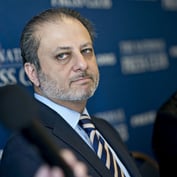What You Need to Know
- Prosecutors say Tournant assured investors safety was his top priority but secretly took undisclosed risks, resulting in fraud that cost investors $7 billion.
- Tournant’s group used equity-based options to market what he said was an all-weather strategy that would protect investors from losses in good times and bad.
- In 2015, the fund “abandoned the promised hedging strategy and instead began to purchase cheaper hedges that were further out of the money.
He was a hedge-fund manager supposedly under the watchful eye of a “master cop” — an Allianz SE unit that policed his every move.
Instead, U.S. authorities say, Greg Tournant sold lies to investors that cost customers, and now Allianz, billions of dollars, and resulted in a guilty plea to federal charges of securities fraud by Allianz Global Investors US.
News on Tuesday that the U.S. unit of the German insurance giant was admitting guilt over the collapse of its Structured Alpha group of hedge funds leaves many questions unanswered, including a big one: Will Tournant, who’d told investors Structured Alpha would do well whether markets went up or down, end up in prison?
For Allianz SE, Tuesday’s development brought an end to legal headaches that have engulfed the German insurer since the funds imploded in March 2020, when financial markets reeled during the early days of the pandemic.
The demise of the Structured Alpha funds is just the latest illustration of the outsized damage an obscure trading operation can wreak on an A-list financial institution. Think Archegos, Long-Term Capital Management and the hedge funds whose collapse led to the demise of Bear Stearns.
Tournant, 55, now faces charges that are upending his career and could send him to prison for decades if he’s convicted. Former colleagues have turned on him, as has Allianz.
Tournant turned himself in to authorities in Colorado, where he lives, and faces trial in federal court in New York.
See: Allianz Unit to Plead Guilty, Pay Billions Over Fund Losses
His attorneys said the charges are an “ill-considered attempt by the government to criminalize the impact of the unprecedented, COVID-induced market dislocation of March 2020.” While regrettable, the losses “are not the result of any crime,” they said.
Tournant was released on a $20 million bond Tuesday.
‘Massive Fraud’
Prosecutors say that while Tournant assured big investors safety was his top priority, he secretly took huge, undisclosed risks. The result was a massive fraud that cost investors $7 billion, they say.
Tournant, the chief investment officer at Miami-based Structured Alpha, spent years “smoothing” performance data, lying about hedges against market downturns, and pretending risk managers at Allianz Global Investors US were carefully monitoring his every move, prosecutors charged in an indictment.
Two of his top lieutenants, Stephen Bond-Nelson and Trevor Taylor, agreed to plead guilty and are cooperating with prosecutors. They face long prison terms but could get far less time for their cooperation. All three men were also sued by the Securities and Exchange Commission.
Prosecutors and regulators revealed new details of how they say Tournant, Taylor, and Bond-Nelson duped investors, consultants, colleagues and auditors.
‘Star Performers’
As star performers at Allianz Global Investors US, Tournant and Taylor each earned $51.3 million from 2016 to 2020 and Bond-Nelson made $12 million, according to the SEC.









 May 19, 2022 at 02:23 PM
May 19, 2022 at 02:23 PM











